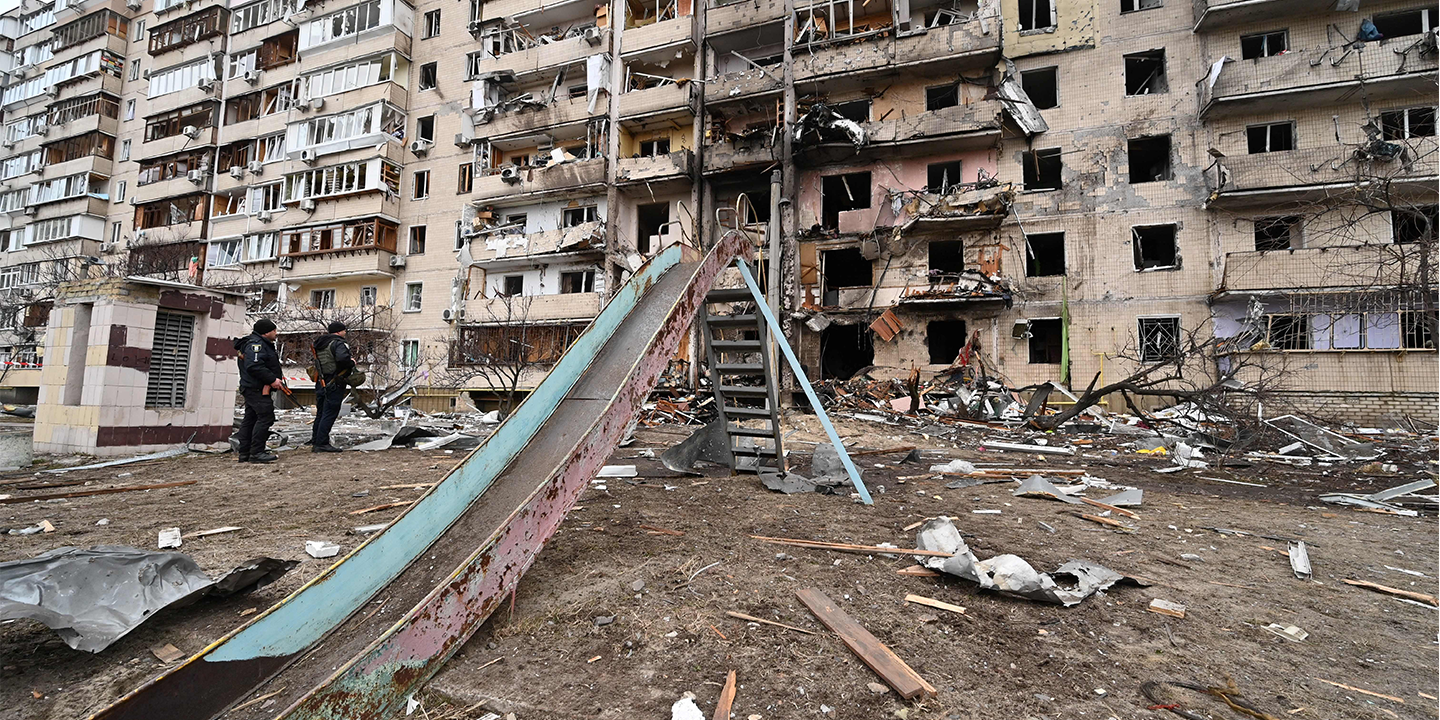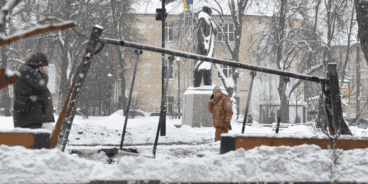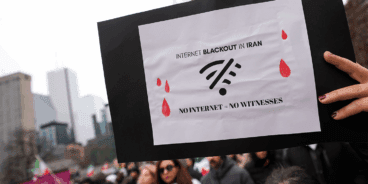

Atrocity Alert No. 290: Ukraine, Myanmar (Burma) and Nigeria
Atrocity Alert is a weekly publication by the Global Centre for the Responsibility to Protect highlighting situations where populations are at risk of, or are enduring, mass atrocity crimes.
ATTACKS ON CIVILIAN INFRASTRUCTURE AS RUSSIA’S INVASION OF UKRAINE CONTINUES
On Thursday, 24 February, forces from the Russian Federation invaded Ukraine and began launching attacks on major cities, including the capital, Kyiv, as well as Kharkiv, Kherson, Mariupol and others. Between 24-28 February the Office of the UN High Commissioner for Human Rights verified at least 142 civilian deaths, including 13 children, though the actual death toll is likely much higher. Most casualties were caused by the use of indiscriminate explosive weapons, including shelling from heavy artillery and multiple rocket systems. Reports have indicated several attacks on civilian infrastructure, including apartment buildings, homes, schools and hospitals, as well as the Babyn Yar Holocaust memorial site. Attacks on these objects and the use of indiscriminate weapons is in violation of International Humanitarian Law (IHL) and may amount to war crimes.
The conflict has forced over 874,000 people to flee Ukraine to neighboring countries. Some minority populations attempting to flee, including civilians of African, Asian and Middle Eastern descent, have reported being removed from trains, beaten and/or harassed by border authorities. Under the Refugee Convention, the international community has both a moral and legal obligation to assist all refugees, regardless of race, religion or country of origin.
Following Russia’s veto of a draft UN Security Council resolution on 25 February, the Council adopted a “Uniting for Peace” resolution, which allows the General Assembly to give recommendations on responses to security crises when the Security Council fails to act “because of a lack of unanimity of the permanent members.” On 2 March, during an emergency special session, the General Assembly adopted a resolution condemning Russia’s use of force in Ukraine and the subsequent violations of IHL and International Human Rights Law. The resolution also called on all parties to protect civilian populations and objects from attack. Additionally, the Human Rights Council will hold an urgent debate on 3 March.
Numerous states and regional organizations have responded to the invasion with crippling sanctions and other economic measures. On 28 February the Chief Prosecutor of the International Criminal Court announced his intention to open an investigation. The Court previously found evidence of war crimes and crimes against humanity during a preliminary examination of the “Maidan” protests and armed conflict in eastern Ukraine since 2013. Ukraine has also filed a case with the International Court of Justice, asking for the Court’s clarification under Article IX of the Genocide Convention, after the Russian government accused Ukraine of committing a genocide against Russian-speakers in eastern Ukraine. The claim has been internationally rebuked as false.
Savita Pawnday, Executive Director of the Global Centre for the Responsibility to Protect, said that, “while we welcome the uncharacteristically quick response of the international community, civilians will continue to be at an ever-increasing risk of atrocities until the armed conflict ends. Ensuring Russia halts the invasion is paramount.”
ICJ HEARS MYANMAR’S OBJECTIONS TO ROHINGYA GENOCIDE CASE
On 28 February the International Court of Justice (ICJ) concluded hearings on Myanmar’s (Burma) preliminary objections to The Gambia’s case on the genocide against the Rohingya. In 2019 The Gambia filed suit against Myanmar at the ICJ, accusing Myanmar of violating its obligations under the Genocide Convention. On 23 January 2020 the ICJ issued four provisional measures, ordering the government of Myanmar to take immediate action to protect its “extremely vulnerable” Rohingya population from potential genocidal acts. Myanmar later filed four preliminary objections to the case in January 2021, disputing The Gambia’s standing to file the case and challenging the Court’s jurisdiction.
The Gambia v. Myanmar is a historic lawsuit seeking to acknowledge Myanmar’s responsibility as a state for the genocide committed against the Rohingya. Starting in October 2016 and then again in August 2017, Myanmar’s military – the Tatmadaw – engaged in so-called “clearance operations” against the Rohingya, a distinct Muslim ethnic minority, in Rakhine State. The operations were characterized by brutal violence and serious human rights violations that, according to UN investigations, amount to genocide and crimes against humanity. Survivors reported indiscriminate killings, rape and sexual violence, arbitrary detention and torture. The clearance operations followed decades of systematic persecution of the Rohingya by the government.
During the hearings, Dawda Jallow, The Gambia’s Minister of Justice, emphasized that, “The Gambia may be a geographically small state, but we stand tall in the international community of States and take pride in promoting and protecting human rights, and international accountability for atrocity crimes like genocide. Justice and accountability for those acts of genocide, and for Myanmar’s ongoing acts of genocide, is not just possible – it is necessary.”
The hearings were the first proceedings in The Gambia v. Myanmar since the February 2021 coup. Myanmar’s military is currently representing the state at the ICJ. The decision on the preliminary objections and whether the case can proceed will be released at an undetermined date. In the meantime, the four provisional measures remain in place.
Liam Scott, Research Associate at the Global Centre for the Responsibility to Protect, stated that, “the case at the ICJ provides a long-awaited opportunity for victims and survivors. While the provisional measures offer some protection, many of those responsible for the genocide remain in power and there is no indication that they are complying with these measures.” The military continues to perpetrate atrocities against the Rohingya and other populations across Myanmar with impunity.
DOZENS OF CIVILIANS KILLED IN A SPATE OF ATTACKS IN NIGERIA
Since Friday, 25 February, the so-called Islamic State West Africa (ISWA) have perpetrated a series of attacks in Borno State, northeast Nigeria. On Friday alleged ISWA fighters killed three civilians and destroyed a church in Kautikeri village, Chibok district, Borno State. This was the second reported attack on the village in a month. ISWA fighters subsequently attacked three villages – Sabongarin Kimba, Mandara-Girau and Ngama – killing at least 24 civilians for allegedly assisting government troops in their search for armed extremists. The villages are reportedly on the periphery of a key extremist hideout.
These attacks took place days after the Governor of Borno State, Babagana Zulum, updated President Muhammadu Buhari on the latest security developments, stating that the security situation had improved and thousands of fighters from the armed extremist groups Boko Haram and ISWA have surrendered. Since January, security forces have reportedly killed at least 180 fighters. Sustained land and air raids between 10 and 24 February led to the surrender of 466 fighters. However, ISWA have escalated their attacks in recent weeks, leaving populations at risk.
Despite the violence, ISWA and Boko Haram have gained popularity among local communities by providing basic services and security in exchange for controlling trade and imposing taxes. ISWA have also secured trade routes and revived farming and fishing activities.
Civilians in central and north-west Nigeria are also facing increased inter-communal violence and attacks by armed bandits. Attempting to combat the combined threat of large-scale banditry and armed extremism, Nigeria’s armed forces have been deployed in two-thirds of the states in the country and are overstretched.
Juliette Paauwe, Senior Research Analyst at the Global Centre for the Responsibility to Protect, said that, “the proliferation of armed extremist groups resulted in part from the government’s reliance on a military strategy, which has failed to address the root causes of conflict in Nigeria. The increase in ISWA attacks amidst the ongoing government offensive is indicative of the need to invest in broader social reforms alongside a military strategy to combat armed extremism.”
Related Content


Atrocity Alert No. 466: Ukraine, Syria and Crimes Against Humanity Treaty
